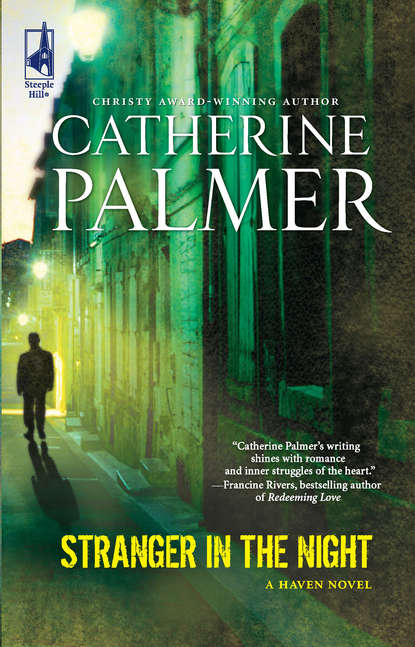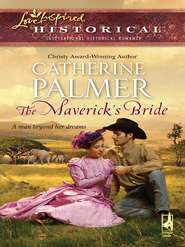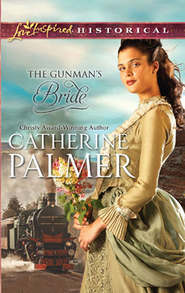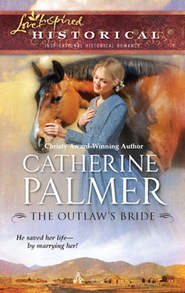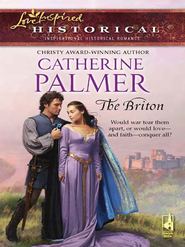По всем вопросам обращайтесь на: info@litportal.ru
(©) 2003-2024.
✖
Stranger In The Night
Автор
Год написания книги
2019
Настройки чтения
Размер шрифта
Высота строк
Поля
“You still got that letter?” Terell asked, focusing on the man’s wife. “Uh…what was the name?”
“Mary.” Stephen Rudi spoke for her. He fished in his pocket and then unfolded a tattered sheet of notebook paper. Holding it out to Terell, he tapped a place near the end of the page. “This is the address, sir, but my wife’s brother is not to be found. Our search revealed nothing, not even the correct street.”
While Terell and Sam studied the letter, Joshua appraised the Pagandan woman who stood beside her husband. Tiny and thin-boned, she wore large round spectacles that all but masked the distinguishing features of her face. She kept her eyes downcast and her fingers woven together, as if determined to draw no attention to herself. Joshua had seen this attempt at self-preservation in Afghani women and children. An effort to hide in plain sight.
A scarf, elaborately knotted, covered her head. Her dress, threadbare pink gingham with eyelet lace at the neck, was mostly covered by a length of ethnic-patterned fabric. She had wrapped it in a sort of African sarong. The woman had the look of a frightened bird.
Turning his assessment to the two children, Joshua saw exhaustion weighing on them. They gazed up at their father in a mixture of respect and concern. Charity’s hair was braided in messy cornrows. Her bright almond eyes glowed with intelligence. She had white teeth, a pug nose, round cheeks. She would do well in school, Joshua thought.
The boy was a mirror image of his older sister—minus the cornrows and several teeth. How did so many five-year-olds manage to lose their two front teeth not long before Christmas? he wondered. The old song “All I Want for Christmas is My Two Front Teeth” wouldn’t be meaningful without a few toothless kids belting it out.
“I don’t think that street exists,” Terell commented. He passed the letter to Sam. “You ever heard of this place?”
Joshua eyed the document as his friend read it. Pulled from a college-ruled notebook, the page had been handled so much it was about to fall apart. Messy pencil marks were smudged, hard to read. A grease spot had blurred the signature. In the upper-right corner, a water ring muddied the blue lines. The letter was written in an African language, but the address at the end was clear enough.
Sam returned the precious page to its owner. “You sure this is in St. Louis, Mr. Rudi?”
“Indeed, sir.” Stephen glanced at his wife, suddenly hesitant. He spoke to her in their mother tongue for a moment. Head low, she uttered a couple of barely distinguishable words in response.
Stephen nodded. “If you please, sir. My wife is quite certain her brother lives in St. Louis.”
Terell and Sam eyed each other for a moment. Finally Sam spoke up. “I’m sorry, but Haven is not a homeless shelter. Our mission statement prohibits taking in strangers. We have a rule.”
Joshua couldn’t believe what he was hearing. He nudged his friend’s elbow. “Sam, can I talk to you for a second?” They stepped back into the building. “Since when did you abide by rules?”
“If we let these folks in,” Sam replied in a low voice, “we can’t turn anyone else away.”
“Come on, man. We can’t leave those kids on the street.”
Sam gave him a long look and shrugged. “I’ll probably regret this, but okay.”
As they emerged onto the sidewalk, Joshua reached for the children’s hands. “Come on, you two. The sooner you’re settled, the sooner we can all get some sleep.”
Sam let out a breath. “We’ll put you up for the night, Mr. Rudi. No longer than a week, though.”
“That’s our max, so don’t try to argue us out of it.” Terell spoke as firmly as he could, which wasn’t saying much. “Do you understand?”
Terell Roberts looked as if he could tear a man’s head off. But his gentle tone led Joshua to believe the guy was a bona fide teddy bear—compliant, impossibly kind, generous. How would he respond in a conflict situation?
“We would never wish to impose upon your kindness,” Stephen vowed to his benefactors as Sam bolted the door behind them. “Indeed, we are sincerely grateful.”
The Rudi family accompanied Terell across the basketball court toward the stairwell. Sam followed with Joshua.
“They’ll beg for more time,” Sam said under his breath. “They always do. The homeless, hungry, sick, battered, dying—they come to Haven hoping for a solution to their problems.”
“Do they ever find one?”
“Temporarily. We let them stay a night or two until they find other quarters. Relief agencies, shelters, food kitchens fill the gap. But it’s never enough.”
“Doesn’t the constant need drag you down?”
“Nah. It’s like the war. You focus on the good, the hopeful.”
“Your fiancée?”
Sam smiled. “Ana helps.”
The woman who had walked into Sam’s life that summer brought him to life again, he had told Joshua. He felt almost human for the first time since his military discharge. Sam said Ana’s intensity matched his own. She could be difficult and definitely stubborn. But with Ana, he could let down his guard.
Joshua was happy for his friend. He’d been too long without a woman in his own life, and he didn’t see much prospect for that changing anytime soon. Most of the girls at home were provincial. They believed everything they heard on television. Few had set foot outside the U. S. Some had never left Texas.
One or two women had caught Joshua’s eye while in Afghanistan, but a military romance was not for him. He enjoyed a lady who knew how the world functioned, but he didn’t want the separation or anxiety of such a relationship. He wouldn’t like to worry about safety. If he ever found love, he couldn’t risk losing it. So he had kept himself distant, focused on the task at hand.
“Ana’s not the only good thing in my life,” Sam said as they approached the stairwell. “We’ve got a lot to be thankful for around here. Lead paint abatement crews just finished stripping and recoating our walls. Ana wrote an article about the paint problem, and a surge of donations poured in. We formed a nonprofit organization—complete with a board of directors and grant writers. The bathrooms are finally working. The ramps, exits and stairwells meet code. It’s been a long haul.”
“The place looks good,” Joshua agreed.
“We’ve got new volunteers, too. Plus, the vet gave Duke an all-clear this morning. Hip dysplasia forced him out of police K-9 service too early, but he’s been God’s gift to us.”
“And this Pagandan family. Thanks to Haven, they’ll sleep safely tonight.”
“You’re the one who made that happen,” Sam said. “We’ve turned away people a lot more pitiful.”
“I’d never let a kid sleep on the streets. You wouldn’t, either, Hawke. You know it.”
As they began to climb the steps to the second floor, Charity and Virtue stretched tiny hands to pat the big dog. Joshua guessed the canine had been trained to sniff out drugs and could take down a grown man, but these small children sensed he wouldn’t harm them.
When Virtue sagged against the stairwell wall, Joshua lifted the tired boy into his arms. Sam scooped up the little girl.
“So Paganda has some big cities?” Terell was asking their father.
“One,” Stephen said. “But we come from a small village beside Lake Victoria. Our people were fishermen.”
“Were?” Terell frowned. “You mean they stopped?”
“Sir, the village was burned. My people…are not there now.”
Joshua silently prayed that Terell would take the hint. But subtlety was not the man’s strong suit.
“Headed for refugee camps, I’ll bet. Good thing you got your family out.”
“My children and I are three of only nine people who survived from my village.” Stephen paused in the stairwell, his voice growing low. “When my wife learned that the rebel army was coming, she placed these two—the youngest except for our baby—inside a metal water drum. There were only a few liters remaining inside it, and she put a padlock on the top. Because of rust, the drum had small holes. Through these, the air could come. When I returned to my house, I saw that the roof and walls had burned. Rebels had looted the furnishings. But God protected the drum. Inside it, I found my two children.”
As Stephen spoke the final words, a chill crawled up Joshua’s spine. The drowsy little boy whose head lolled against his shoulder had survived the destruction of his village because his mother had hidden him in a water drum? At their young ages, the kids might have drowned. The burning house could have caved in on top of them. They might have been discovered and killed. The child was a miracle.
“But where were you the whole time?” Terell asked Stephen as the group walked down a hall.
His grunt was bitter. “I was attending a pastors’ meeting in another town. When I heard news of the rebel attack, I rode my bicycle as fast as I could. But I arrived at my village too late.”





